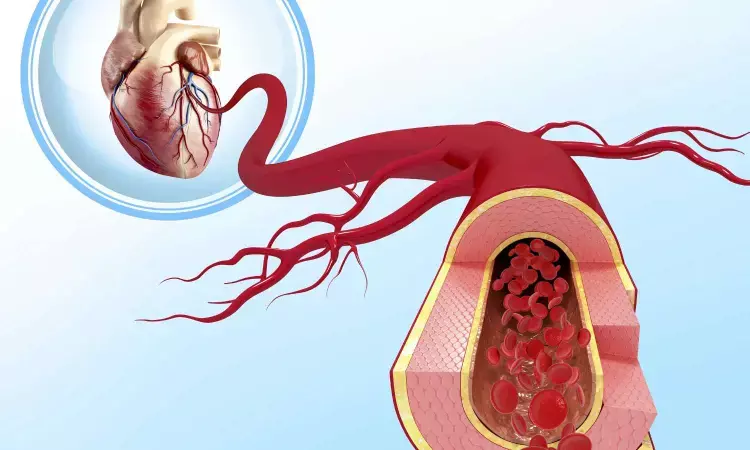- Home
- Medical news & Guidelines
- Anesthesiology
- Cardiology and CTVS
- Critical Care
- Dentistry
- Dermatology
- Diabetes and Endocrinology
- ENT
- Gastroenterology
- Medicine
- Nephrology
- Neurology
- Obstretics-Gynaecology
- Oncology
- Ophthalmology
- Orthopaedics
- Pediatrics-Neonatology
- Psychiatry
- Pulmonology
- Radiology
- Surgery
- Urology
- Laboratory Medicine
- Diet
- Nursing
- Paramedical
- Physiotherapy
- Health news
- Fact Check
- Bone Health Fact Check
- Brain Health Fact Check
- Cancer Related Fact Check
- Child Care Fact Check
- Dental and oral health fact check
- Diabetes and metabolic health fact check
- Diet and Nutrition Fact Check
- Eye and ENT Care Fact Check
- Fitness fact check
- Gut health fact check
- Heart health fact check
- Kidney health fact check
- Medical education fact check
- Men's health fact check
- Respiratory fact check
- Skin and hair care fact check
- Vaccine and Immunization fact check
- Women's health fact check
- AYUSH
- State News
- Andaman and Nicobar Islands
- Andhra Pradesh
- Arunachal Pradesh
- Assam
- Bihar
- Chandigarh
- Chattisgarh
- Dadra and Nagar Haveli
- Daman and Diu
- Delhi
- Goa
- Gujarat
- Haryana
- Himachal Pradesh
- Jammu & Kashmir
- Jharkhand
- Karnataka
- Kerala
- Ladakh
- Lakshadweep
- Madhya Pradesh
- Maharashtra
- Manipur
- Meghalaya
- Mizoram
- Nagaland
- Odisha
- Puducherry
- Punjab
- Rajasthan
- Sikkim
- Tamil Nadu
- Telangana
- Tripura
- Uttar Pradesh
- Uttrakhand
- West Bengal
- Medical Education
- Industry
P2Y12 drugs may be better than aspirin to prevent heart attack and stroke in patients with CAD, reveals research

Giving a P2Y12 inhibitor anti-clotting drug to patients with coronary artery disease is associated with lower rates of cardiovascular death, heart attack and stroke compared with traditional aspirin, with no increased risk of major bleeding, finds a study published by The BMJ today.
P2Y12 inhibitors are often given to patients alongside aspirin (“dual therapy”) after percutaneous coronary intervention (PCI) - a procedure to widen or unblock a coronary artery - to help prevent cardiovascular events including heart attack and stroke.
After several months, patients are usually switched from dual therapy to lifelong aspirin, but some trials have suggested that a P2Y12 inhibitor may be more effective for long term prevention than aspirin.
To explore this further, researchers analysed individual patient data from five randomised clinical trials involving 16,117 patients (average age 65; 24% women) who were assigned to a P2Y12 inhibitor (clopidogrel or ticagrelor) or aspirin after completing dual therapy following PCI.
After an average follow-up period of around 4 years, P2Y12 inhibitor therapy was associated with a 23% lower risk of an outcome that combined cardiovascular death, heart attack, or stroke, compared with aspirin, with no significant difference in major bleeding. This means that for every 46 patients taking a P2Y12 inhibitor instead of aspirin after dual therapy, one cardiovascular death, heart attack, or stroke would be prevented.
When considering outcomes individually, P2Y12 inhibitor therapy reduced heart attacks and stroke compared with aspirin. However, all-cause death, cardiovascular death, and stent thrombosis were similar between the treatments.
The researchers acknowledge that some changes in the original design of some trials were needed to create uniform data, and that certain characteristics of individual trial populations may reduce the generalisability of the findings.
But they say no significant difference in major bleeding between groups was seen, and results were consistent after further analyses accounting for factors such as age, sex, geographical region, smoking, previous heart attack or stroke, underlying conditions and medication history, suggesting they are robust.
“Overall, this study supports preferential P2Y12 inhibitor monotherapy prescription over aspirin due to reductions in major adverse cardiac and cerebrovascular events (MACCE) without increasing major bleeding in the medium term,” say researchers in a linked editorial.
However, they note that “medium term efficacy does not necessarily extend lifelong, which is the duration we advise patients to continue these medications.”
As such, they suggest that “a large-scale globally representative trial directly comparing different monotherapy strategies (including discontinuation) with extended follow-up would benefit our understanding of the long-term impact of P2Y12 inhibitor monotherapy across the treatment class for secondary prevention following PCI.”
Reference:
Giacoppo D, Gragnano F, Watanabe H, Kimura T, Kang J, Park K et al. P2Y12 inhibitor or aspirin after percutaneous coronary intervention: individual patient data meta-analysis of randomised clinical trials BMJ 2025; 389 :e082561 doi:10.1136/bmj-2024-082561
Dr Kamal Kant Kohli-MBBS, DTCD- a chest specialist with more than 30 years of practice and a flair for writing clinical articles, Dr Kamal Kant Kohli joined Medical Dialogues as a Chief Editor of Medical News. Besides writing articles, as an editor, he proofreads and verifies all the medical content published on Medical Dialogues including those coming from journals, studies,medical conferences,guidelines etc. Email: drkohli@medicaldialogues.in. Contact no. 011-43720751


